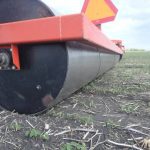“(The amendments are intended to) only regulate where necessary and to devolve programs or services that would be appropriately provided by the private sector…”
– jim smolik, cgc commissioner
Call it “Plan B.”
With the Conservative government’s Bill C-13 proposing to reduce the role of the Canadian Grain Commission (CGC), the Canadian Wheat Board (CWB) is setting up a laboratory to do some of its own testing to ensure grain quality control continues for its 70 or so customers around the globe.
Read Also

Trade uncertainty, tariffs weigh on Canadian beef sector as market access shifts
Manitoba’s beef cattle producers heard more about the growing uncertainty they face as U.S. tariffs, and shifting trade opportunities, reshape their market.
“We want to be able to manage the best we can in a system where the government (through the CGC) may be pulling back from their obligations and responsibilities,” Earl Geddes, the CWB’s vice-president of farmer service, said in an interview March 5.
The CGC, created in 1912, is Canada’s grain industry watchdog, ensuring farmers are treated fairly by grain companies and protecting the quality of Canadian grain.
The federal government says proposed changes to the Canada Grain Act will modernize the CGC and help it serve farmers and industry better. Critics say the bill will weaken the CGC’s role, increase farmers’ risk and undermine grain quality.
CGC commissioner Jim Smolik told farm leaders during a telephone briefing Dec. 14, 2007 the amendments are intended to “reduce costs,” improve grain industry efficiency and competitiveness and to “only regulate where necessary and to devolve programs or services that would be appropriately provided by the private sector…”
Geddes said he doesn’t want the CGC’s role diminished.
“We run a system… that generates the best wheat in the world and the grain commission is part of that system,” he said. “As we start dropping these pieces out (like kernel visual distinguishability) our customers are saying, ‘What in the hell are you doing? We buy your wheat, we pay you more for your wheat because we know we’re going to get guaranteed quality. And your system (as a whole) delivers that, not any one part of it.’ You start to erode the pieces and your ability to supply the best wheat in the world is at risk.”
Geddes said the lab will save farmers money and that’s why the CWB’s board of directors approved it last year. Not only will the lab assist the CWB if CGC service is cut, but it will help the CWB do a better job managing grain movement as grain, collected at country elevators, is tested before it arrives at port.
NOT DUPLICATING
“This laboratory should drive a fair chunk of cost out of our system and give us an ability to prioritize when samples get tested,” Geddes said. “There are some really positive pieces to it.”
The CWB lab will test, among other things falling number (a measure of breadmaking quality), and DON (deoxynivalenol), the toxin caused by fusarium head blight.
Geddes said the CWB lab is not duplicating what the CGC already does, but replacing some of services the CWB hires others to do.
“We’ve been making these investments on farmers’ behalf and setting up these plans so strategically they are well positioned if these changes (to the CGC) actually come into the marketplace,” he said.
If C-13 becomes law the CGC will cease inward inspection of grain delivered to terminal elevators, although upon request private inspection companies could do inspections. The CGC would arbitrate any disputes arising from those inspections.
The CGC’s mandate would change. The current legislation states the CGC “shall, in the interests of the grain producers, establish and maintain standards of quality for Canadian grain and regulate grain handling in Canada…”
The proposed new mandate has two parts:
establish and maintain standards of quality for Canadian grain and regulate grain handling in Canada to ensure a dependable commodity for domestic and export markets; and
protect the interests of grain producers with respect to deliveries to elevators and grain dealers, the allocation of producer railway cars and the binding determination of grade and dockage of grain by the commission.
One of the most controversial changes is to drop the requirement that licensed grain buyers post security to cover what they owe farmers for the grain they deliver. It would be up to farmers to develop an alternative.
BILL FLAWED
Recently David Anderson, parliamentary secretary for the Canadian Wheat Board, told the House of Commons farmers will get better served at a lower cost if C-13 becomes law.
But Liberal Agriculture Critic Wayne Easter said the bill is flawed and the cost-benefit study requested by the agriculture committee has not been done.
“The prime minister’s mantra has been to deregulate and that is in fact what the government is doing with the Canadian Grain Commission,” Easter said. “The government is taking away that protection that is there for the Canadian grain producers, for our exporters and for our industry…”
In an interview later Easter said the opposition is willing to work with the government on the bill, but it needs a lot of changes. [email protected]















